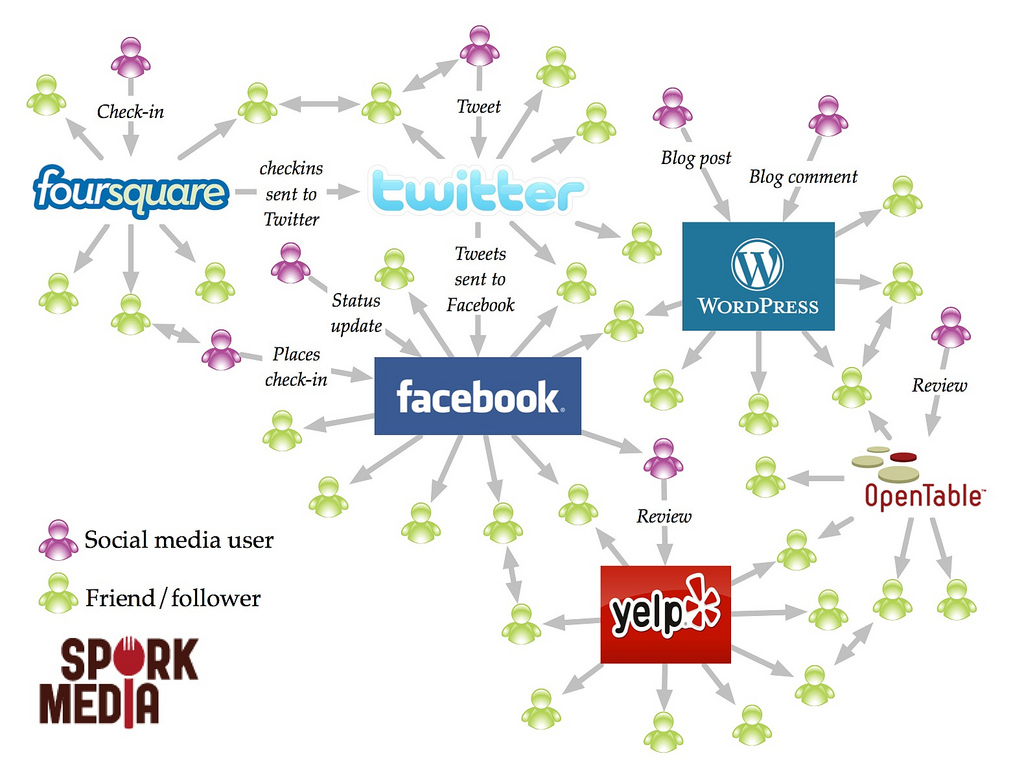Which Social Media Networks are Right for Your Law Firm?
Featured image courtesy of kat m research licensed under creative commons.
Which Social Networks Should My Law Firm Join?
Social Networking seems to be growing exponentially. Nearly every week, we get an invitation for a new network. At first it was just LinkedIn, Facebook, and Twitter. Google+, Pinterest, and many others have since sprouted up. How do you know if your firm needs a YouTube page? Should you be on Flickr? In this post we will do our best to help you decide which networks are right for your law firm.
First, we need to establish that your firm should be using social media at all. Is there really a reason to invest so much time and effort into something that does not provide clear results? Yes. Here are three of the most important reasons why:
- If someone is using social media to find a lawyer, your firm has to be there or else it won’t be found.
- If all of your competitors and colleagues are using social media, but you aren’t, your firm may appear less cutting edge and up to date.
- Social media, when used correctly, is a conversation. It is a way to make connections and learn.
Once you have decided to establish social media accounts for your firm, you must decide which networks make the most sense for you. First, I will deal with the no-brainers.
Networks Your Firm Must Join
When you first log on to Twitter, it appears to be a jumbled chaotic mess full of spammers and self-proclaimed experts. However, after a little exploring, it becomes apparent that Twitter is the largest conversation that has ever existed. Part of that conversation is about the practice of law, and, as it has often been said, that conversation will happen whether you participate or not. The decision to not only use Twitter, but to participate in that conversation, drives learning, networking, and the practice of law. Twitter is also the place many people go to complain (or rave) about businesses and services. Monitoring Twitter regularly allows you to see what people are saying about you. We have previously published a post that can help you figure out who to follow on Twitter if you are just getting started. (Follow DotCO Law Marketing on Twitter)
LinkedIn is a place for professionals to meet. It is a bit like Facebook, but more business oriented. Every lawyer should be on LinkedIn individually and every firm should also have a page. LinkedIn helps lawyers cultivate and maintain professional relationships made offline while allowing for introductions and networking online. Built-in groups features help you plan events and have discussions. Job search features can help you find new employees. (Find us on LinkedIn)
By now, you probably know what Facebook is and how it works. The important question is whether your firm belongs there. It does. Believe it or not, there are people who will look for a lawyer on Facebook. Just being there might get you a client at some point. Law firms should not expect to get the same reaction from their pages that major corporations get. There is no reason why your law firm should ever have thousands or “likes” or fans. Facebook does allow you to easily share links, contact information, and other relevant news without keeping a window open all day. Your firm’s Facebook page will not need constant monitoring, as almost no one will visit it. If you are investing time on social media, it is worth a few hours to create a Facebook page, but do not let it drain your time or resources after that. (Visit DotCO Law Marketing on Facebook)
Networks to Join for a Specific Purpose
Google+
Google+ seems to have stalled a bit since its inception. No one is quite sure what to use it for right now. Its main advantage over Facebook in its infancy was better privacy controls. However, Facebook has since adopted similar mechanisms. The biggest reason to be on Google+ is that it gives your firm the appearance of being tech-savvy. People do not accidentally find themselves on Google+, and anyone finding your firm’s page there will realize this. A firm with a Google+ page gives the appearance of staying current in technology, which may also help you convince potential clients that you are on the forefront of legal practice. Google+ does not seem the be the place where the future of legal discourse will evolve, but is probably the best social network for people interested in the advancement of technology.
YouTube
If your firm has a good reason to be on YouTube, you probably already have an account. Posting videos about commonly asked legal questions is a great way to get attention while helping potential clients. Your firm might also make videos introducing all of its employees, partners, and associates, or give a tour of your office. YouTube’s utility is somewhat limited, but a great video can be seen by thousands of people.
Networks Your Firm Can Safely Ignore
Flickr
There is almost no reason why your firm would need a Flickr account. While we have previously discussed the importance of keeping a good camera around, it doesn’t make too much sense for a law firm to keep many pictures online. A gallery on your website or Facebook showing off your employees and office is fine, but you should not expect to accomplish any useful legal networking on a site like Flickr.
Spotify
While Spotify has been rapidly growing as a network for music fans, it offers no real benefit to law firms. That being said, it doesn’t hurt to grab a personal account and see what your friends are listening to.
Myspace
To paraphrase Disney’s Lion King:
Mufasa: Everything the light touches will be yours
Simba: What about that shadowy place?
Mufasa: That is Myspace. Lawyers must never go there, Simba.
Too Early to Know
It seems that every day, we come across multiple articles on Pinterest. Some of them are even about how lawyers can use this service. It doesn’t hurt to make a page for your firm, just to hold the name. It could turn out that Pinterest gets huge, and that lawyers flock to it, but we wouldn’t suggest spending too much time on it right now.
Does Your Law Firm Use Other Social Networks?
Have we missed any important social networks that your firm uses? Please comment and tell us what other networks make sense for your firm.
Read MoreWhat Using Yelp for V-Day Taught Me about Reputation Management
Featured image courtesy of brad.coy licensed under creative commons.
What a Great Valentine’s Day Dinner at Stella! Taught Me about Online Reputation Management on Yelp
Last week, I wrote about Online Reputation Management for Law Firms. I intended to move to a totally different topic this week, until I had a particularly interesting experience with Yelp on Valentine’s Day. Living in New Orleans, there is a near endless list of great restaurants to bring a Valentine’s date to. Being the romantic sap / foodie that I am, I wanted the best. By most accounts I had seen in recent years, Stella! was about as good as it gets, so I made a reservation. The next day, out of curiosity, I started doing more research. I spent a long time on Yelp. What I found horrified me. While Stella! had a 4-star rating, many of its recent reviews were terrible. People complained about everything from the temperature of the food and the price to the wait staff and the restaurant’s policy on cancelling reservations.
For a while, I was quite nervous, thinking that I had made a terrible decision. A closer inspection, however, revealed that I probably had no reason to worry. It turns out some people just like to complain. One reviewer gave a poor rating because the party next to them was loud. Another was upset because the amuse bouche wasn’t vegan. I decided to keep my reservations and take a chance.
From the first bite, I knew that I had made the right decision. My date and I were both extremely happy with every single thing we ordered. The service was excellent, the ambiance was amazing and we had a great time. My date told me it was the best meal she had ever eaten in New Orleans. Within a few hours, I had added my own Yelp review.
Not the most exciting story in the world, but I think all business owners and many law firms can learn from it. Even the smallest inconvenience or perceived problem can spur someone to write an angry review. Before people used the internet to voice their complaints, this wasn’t such a big problem. Everyone knows some people who like to complain about everything, and whose opinions you take with a grain of salt. Unfortunately, when it comes to the internet, it can be hard to tell which reviewers went in looking for a reason to complain and which reviewers had a good reason to be disappointed.
Customer service has always been incredibly important, and the internet has only made it more important for every business or firm to focus on the customer. Businesses should do all that they reasonably can to guarantee customers a great experience. Law firms must do their best to keep clients updated, informed and feeling important.
I made the right decision and moved past the negative reviews to find the truth for myself. Many customers won’t. It is crucial that businesses monitor review sites on a regular basis to deal with poor reviews. The most frustrating review I found on Yelp was by a woman who gave Stella! a 1-star rating without ever actually stepping inside because she was unsatisfied with the tone of the woman on the phone who helped her cancel a reservation a few hours before she was scheduled to eat. This will happen to every business or firm at some point. A non-existent or perceived fault or slight can lead to a damaging review that can be seen by thousands of potential customers and clients. In an era when a single review can have so much power, it is up to your company to keep its reputation solid and to be vigilant about monitoring Yelp and other sites.
Read MoreManaging Your Law Firm’s Online Reputation
Online Reputation Management for Your Law Firm
Frequently, a potential client’s first introduction to your firm is online. The client may see your firm’s website, a legal directory listing, or even a blog post written by an associate. These are generally good things. Unfortunately, if you have disgruntled former clients, potential new clients are likely to come across negative reviews on Yelp, disparaging Facebook posts, or a poor review on Google Places. It is essential that you prevent bad reviews from happening in the first place, and quickly take steps to counteract them if they pop up anyway.
The Key to a Good Online Reputation Starts Offline
The best way to get new clients is word of mouth. Personal referrals lead to law firm growth in a way that usually cannot be matched through advertising. At the same time, a law firm’s reputation is most vulnerable to attacks by its own clients. The best thing you can do to manage your firm’s online reputation is the same thing you already do to manage your professional reputation: Be professional! Treating clients with respect, giving them frequent updates about their case, and staying in touch and open to their concerns can only help you both in your practice and from a business standpoint. Of course, even the best attorney will find themselves at the receiving end of undue anger from a client who should really be upset with their own actions or the law.
The Most Important Places to Monitor Your Reputation
- If your firm has a Facebook page, monitor it. Make sure that any negative comments or posts are dealt with quickly. Simply deleting them can work, but it can also cause a major uproar. Addressing the concerns voiced in a malicious or unflattering post is the best way to fix the problem. Communicate as openly as possible to show other potential clients that you are responsive and have nothing to hide.
- Many unhappy customers take their complaints to Twitter. Searching Twitter daily for your name and your law firm’s name can help you ward off negative attention before it picks up steam.
- Perhaps the worst two places to fight negative reviews are Google Places and Yelp. Both of these services allow for detailed reviews of your firm. Google Places search results appear on nearly every relevant search, while Yelp results are often ranked very high in searches. One or two poor reviews on these services can do incredible amounts of damage to your reputation. It is essential that you not respond negatively to these types of reviews, as this will intensify the situation. If you are having a problem with either of these sites, it is essential that you contact an Online Reputation Management professional.
How to Deal with an Unfair or Negative Review
There are both online and offline solutions to this problem:
Offline Solutions
If a client has posted a negative review, your best bet is to address their concerns. Contacting them directly in an attempt to rectify the problem is generally a good idea. It is essential that you do not accuse or argue with them. Do what you can to persuade them to remove or correct their own review. Threatening your own clients, especially with legal action, will generally only make the problem worse. Even if you believe that the review or comment is defamatory in nature, escalating the dispute will be seen by the public as you attacking your own customers.
Online Self Solutions
Many websites have built in mechanisms for disputing or removing false information. Try to ask a website (politely, and without threatening!) to take down the false information. Encourage other customers to write positive reviews which contrast the problematic post.
Reputation Management Companies
When all else fails, or you feel that you are in over your head, your best bet is to contact a Reputation Management Company. If you are a larger firm, this should probably be the first thing you do. While the services provided can be costly, your reputation is your most valuable asset, and is worth defending. These companies can often work to change search results in a way that hides the problem from simple searches by potential customers.
Other Ideas?
Reputation management is a quickly developing field responding to an ever-evolving problem. Have you found any other useful tools for monitoring or managing your reputation? Have you figured out any strategies for dealing with a rogue client? Does your firm’s social media policy address these situations? Do you have a plan in place for how to quickly and decisively deal with online reputation problems as soon as they pop up? Feel free to discuss these issues in the comments below!
Featured image courtesy of Ethan Hein licensed under creative commons.
Read More








